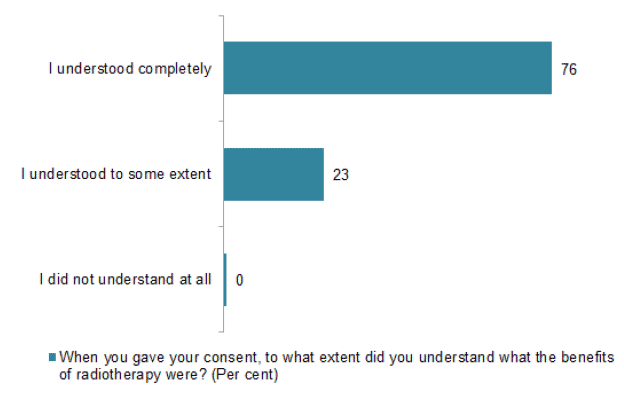Scottish Radiotherapy Patient Experience Survey 2014: National Results: Volume 1
National results from the first Scottish Radiotherapy Patient Experience Survey 2014.
3 RESULTS: CONSENT FOR RADIOTHERAPY
Summary
3.1 Responses from patients on radiotherapy consent were mixed. Patients were particularly positive about being given the opportunity to ask questions and being treated with dignity and respect as well as confidence in the staff taking consent. But on many questions there are some patients for whom consent isn't being properly managed, and who are therefore only satisfied to some extent. This is particularly the case around satisfaction with the way patients' questions are answered (15% of patients were only satisfied to some extent). Similarly a large proportion of patients report that when giving consent they are not completely aware of the benefits (23% understood 'to some extent') and side effects of radiotherapy (33% understood 'to some extent').
Detailed results
3.2 Patients were asked about various aspects of consent including the provision of information about radiotherapy benefits and side-effects, the opportunity to ask questions and staff involved in consent. The results for these questions are summarised in table 1.
Table 1 Summary of the results to questions about consent
| Measure |
Negative |
Neutral |
Partly Positive |
Positive |
|---|---|---|---|---|
| Understood the benefits of radiotherapy |
0 |
23 |
n/a |
76 |
| Understood what the side-effects of radiotherapy were |
2 |
33 |
n/a |
65 |
| Given the opportunity to ask questions before giving consent |
2 |
n/a |
n/a |
98 |
| Satisfied with answers received to questions |
0 |
15 |
n/a |
85 |
| Had confidence in doctors or other health professional who took consent for radiotherapy |
1 |
7 |
n/a |
93 |
| Treated with dignity and respect by the doctor or other health professional who took consent for radiotherapy |
0 |
3 |
n/a |
96 |
Note: percentages may not add up to 100% due to rounding
3.3 In general responses were mixed. Patients were most positive about being given the opportunity to ask questions and being treated with dignity and respect as well as confidence in the staff taking consent. For example:
- 98% of patients indicated that they were given the opportunity to ask questions before giving consent.
- 96% of patients said that they were treated with dignity and respect.
- 93% of patients said that they had confidence in the doctor or other health professional who took their consent.
3.4 However patients were markedly less positive about understanding both the benefits and the side-effects of radiotherapy as well as responses to their questions:
- 65% of patients indicated they understood 'completely' the side-effects, while one-third (33%) indicated that they understood 'to some extent'.
- 76% of patients indicated they understood 'completely' the benefits of radiotherapy, while around one in five (23%) only understood 'to some extent' (Chart 4).
- 85% of patients said that they were satisfied with the answers they received to questions that they asked, while around one in six (15%) said that they were only satisfied 'to some extent'.
Chart 4 Understanding the benefits of radiotherapy (%)

Variation between centres
3.5 Across the five radiotherapy centre, there was very little variation in the experiences of patients around consent.
Contact
Email: Fiona Hodgkiss
There is a problem
Thanks for your feedback